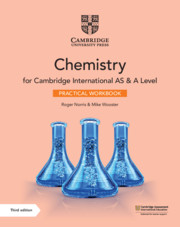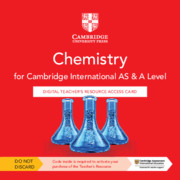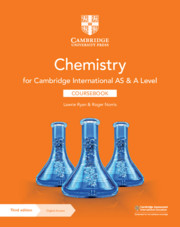Cambridge International AS & A Level Chemistry Digital Practical Workbook (2 Years)
Overview
Extensive research through lesson observations, teacher interviews and work with our online teacher community (the Cambridge Panel) means that this flexible range of resources meets the real teaching needs of the science classroom. This write-in workbook contains step-by-step guided investigations and practice questions for Cambridge International AS & A Level Chemistry teachers and students. Through practical investigation, it provides opportunities to develop skills– planning, identifying equipment, creating hypotheses, recording results, analysing data, and evaluating. The workbook is ideal for teachers who find running practical experiments difficult due to lack of time, resources or support. Sample data – if students can’t do the experiments themselves – and answers to the questions are in the teacher’s guide.
Features
- Guided investigations provide opportunities for students to practise their practical skills.
- Contains help for teachers setting up practical investigations in the classroom.
- For more detailed support with planning and troubleshooting issues, see the teacher’s resource.
- Practice questions give students the chance to test their knowledge and help build confidence in preparation for assessment.
- Includes a skills chapter that focuses on essential science skills.
- Written in accessible language for the ESL learner with key word boxes to improve understanding.
Contents
- Introduction
- How to use this book
- How to use this series
- Safety
- Practical skills
- 1. Masses, moles and atoms
- 2. Structure and bonding
- 3. Enthalpy changes
- 4. Redox reactions
- 5. Chemical equilibrium
- 6. Rates of reaction
- 7. The properties of metals
- 8. The properties of non-metals
- 9. Hydrocarbons and halogenoalkanes
- 10. Organic compounds containing oxygen
- 11. More about enthalpy changes
- 12. Electrochemistry
- 13. Further aspects of equilibria
- 14. Reaction kinetics
- 15. Transition elements
- 16. More about organic chemistry
- 17. Identifying organic compounds.
Brighter Thinking Blog
Keep up to date with the latest classroom tips and educational trends from our brighter thinkers.
Visit the blogCatalogues and Ordering
Looking for something in particular or just browsing? View our catalogues to see our full range of print and digital books.
View and downloadAdvice on useful tools
Advice on useful tools, activities and timetabling from teachers experiencing school closures.
Cambridge GO
All our supporting resources have now moved to Cambridge GO – the new home for your Cambridge digital content.
Listen to our podcast
Listen to our podcast to discover teaching inspiration & advice from leading educational thinkers.








